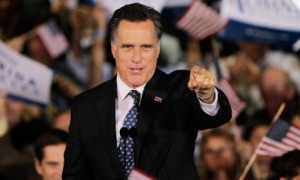Conservatives are asking a reasonable question: Will a Mitt Romney candidacy turn into another debacle like Sen. John McCain’s in 2008? The Arizona maverick was said to be the most “electable” of the Republican nominees. Many GOP voters held their noses and supported Mr. McCain. Yet he was defeated — convincingly — by Barack Obama. Following Mr. Romney’s crushing victory in Florida’s Republican primary this week, many rank-and-file activists are wondering whether history is about to repeat itself.
The emergence of Newt Gingrich isn’t being driven by a love for the former House speaker. Rather, many conservatives are rallying behind him because he is the only viable alternative to Mr. Romney. Unlike the former Massachusetts governor, Mr. Gingrich is willing to wage a frontal assault on President Obama’s leftist policies. He is not afraid to attack Mr. Obama relentlessly — and with passion, emotion and courage. Gingrich Republicans argue that Mr. Romney possesses no ideological core, that he lacks any fundamental conservative convictions.

Moreover, Gingrich supporters think Mr. Romney is simply another moderate Republican in the mold of Bob Dole and Mr. McCain. Just as those men crashed and burned, so will Mr. Romney, in their view. In their eyes, the Republican Party is about to commit suicide: By abandoning its principles in favor of power, the GOP will lose both. Hence, Mr. Romney must be stopped — even if it means backing a flawed candidate like Mr. Gingrich. This is why his followers are urging him to fight on in the remaining 46 states.
There are similarities between Mr. Romney and Mr. McCain. Both are establishment Republicans. Both are distrusted and disliked by large segments of the conservative movement — especially talk radio. Both have signature issues — Romneycare, McCain-Feingold — that constitute major political liabilities. And both lack personality and charisma. Yet that is where it ends.
In fact, the two men could not be more different. Mr. Romney is a much stronger candidate. He is more articulate, telegenic and disciplined and possesses a considerably deeper grasp of the issues. Mr. Romney would be the first GOP nominee since President Reagan to be able to defend Republican positions effectively. The Bushes, Mr. Dole and Mr. McCain were all dismal failures regarding a key aspect of politics: communication. This alone makes Mr. Romney a serious threat to Mr. Obama’s re-election.
Most important, there is one overriding difference between Mr. Romney and Mr. McCain: The former venture capitalist is not a creature of Washington. The Arizona senator had spent decades on Capitol Hill. He was and still is the consummate insider. During the 2008 campaign, he came across — like Mr. Dole in 1996 — as a career politician, someone obsessed with process and Senate wheeling and dealing.
Mr. Romney is the exact opposite. He has spent most of his life in the private sector, running a successful business and turning around troubled corporations. He has what Mr. McCain never had: genuine executive experience. Also, unlike Mr. McCain, Mr. Romney understands free-market capitalism.
He is a pro-business Republican who will repeal Obamacare, slash burdensome regulations, cut government spending and unleash the economy’s animal spirits. The divergent perspectives of the two men can be seen on illegal immigration. Mr. McCain has championed amnesty; Mr. Romney staunchly opposes it. Mr. McCain embodies Beltway Republicanism, while Mr. Romney adheres to more traditional GOP beliefs such as states’ rights, market-driven growth and a thriving entrepreneurial class. Mr. Romney is running to loosen Washington’s suffocating grip on national life; Mr. McCain cannot imagine life without Washington’s daily involvement. This was Mr. McCain’s Achilles’ heel in 2008.
The great irony is that it was Tea Party conservatives — running on a platform of limited government, low taxes and balanced budgets — who propelled the GOP to make historic gains in the 2010 election. Yet the two leading candidates for the movement’s presidential nomination come from the establishment. The right is understandably demoralized.
His rhetoric notwithstanding, Mr. Gingrich is not an insurgent. In fact, he is less electable and less conservative than Mr. Romney.
The former House speaker’s record is littered with betrayals on a wide range of issues — he supports massive ethanol subsidies, something even Al Gore concedes is a clean-energy boondoggle; he championed a health care individual mandate for more than a decade, including publicly praising Romneycare in 2006; he backed caps on carbon emissions and demanded government action to combat climate change, including filming a TV ad with then-House Speaker Nancy Pelosi; he voted to create the Department of Education; he believes in some form of amnesty; he took $1.6 million from Freddie Mac; and he wants to spend hundreds of billions of dollars in massive projects, such as building a space colony on the moon, establishing a huge power-grid corridor across the Northeast and modernizing ports in Charleston. S.C., and Jacksonville, Fla. In short, Mr. Gingrich is a big-government corporatist masquerading as a conservative populist.
Mr. Romney has serious weaknesses. He is certainly not a Reagan nationalist — my kind of Republican. But he has several indispensable qualities: He can beat Mr. Obama. He can stop America’s decline into a second-rate power. He can reverse our slide toward socialism and economic ruin. He can turn around the bankrupt corporation that is America.
“The perfect is the enemy of the good,” wrote the French philosopher Voltaire. Mr. Romney is far from perfect. He is, however, good enough. He is not the second coming of John McCain. He can win in November. For that alone, he deserves conservative support.
Jeffrey T. Kuhner is a radio talk show personality and a columnist at The Washington Times and WorldTribune.com.

